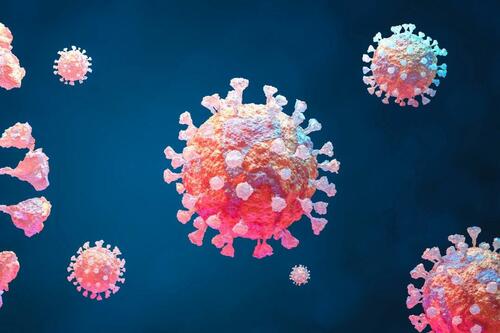Well, what a surprise! Or maybe not.
What is certain and can be said without risk nowadays is that the mRNA vaccines introduce mRNA within your body, that much was as expected. But instead of staying locally in a muscle, often the complex molecules will travel in the bloodstream and settle somewhere in a completely unrelated organ where the RNA will enter cells which will replicate the spikes, at which point your health problems begin. Then what happens can vary enormously. But is bad enough to show up statistically on vast populations as excess mortality and long Covid.
To say that this is not worth investigating is nothing short of criminal.
Authored by Megan Redshaw via The Epoch Times (emphasis ours),
A recent study found that the majority of patients who suffered from long COVID during a time when vaccines and antiviral treatments were widely available were vaccinated.

The observational study published in the Journal of Clinical Medicine, researchers interviewed 390 people in Thailand who contracted COVID-19 during the “fifth wave of the COVID-19 pandemic” when the omicron variant was dominant. Patients were followed by phone from three months after their diagnosis for a year to monitor their physical condition, mental health, sleep disturbances, and quality of life.
Out of 390 people with COVID-19, 377 (97 percent) were vaccinated, 383 (98 percent) underwent antiviral treatment, and 330 (78 percent) developed long COVID syndrome. The most frequently reported symptoms were fatigue and cough. Other reported symptoms included depression, anxiety, and poor sleep quality. The study found that patients under age 60 with a cough as an initial symptom were more likely to develop the condition. In a subset of patients with long COVID, researchers found a notable correlation in females with headaches, dizziness, and brain fog.
“Despite the extensive distribution of vaccines and antiviral therapies, the prevalence of long COVID remains high,” the authors of the paper wrote.
Although definitions of long COVID differ, the Centers for Disease Control and Prevention (CDC) broadly defines long COVID as “signs, symptoms, and conditions that continue to develop after acute COVID-19 infection” that can last for “weeks, months, or years.” The term “long COVID” also includes post-acute sequelae of SARS-CoV-2 infection, long-haul COVID, and post-acute COVID-19.
According to the World Health Organization, while most people with COVID-19 recover and return to normal health, some patients, including those with mild illness, have symptoms that persist for weeks or months after recovering from acute illness.
Nearly 7 percent of U.S. adults surveyed by the CDC in 2022 said they’ve experienced long COVID. Although U.S. regulatory agencies claim vaccinating against COVID-19 can reduce the risk of developing long COVID, the current paper did not find a significant link between the presence of comorbidities or infection severity and the emergence of long COVID symptoms.
Studies Link Long COVID to Vaccination
A February report published by the CDC found that more than 8 percent of participants in seven U.S. states reported having experienced long COVID symptoms. In West Virginia, almost 11 percent of survey participants reported long COVID symptoms. However, the agency did not disclose whether survey respondents were vaccinated.
Some research suggests long COVID may be caused by an immune overreaction to the SARS-CoV-2 spike protein that COVID-19 vaccines use to induce antibodies and that vaccination causes some people to generate a second round of antibodies that target the first.
In a February 2023 study published in the Journal of Medical Virology, researchers analyzed the levels of spike protein and viral RNA in patients hospitalized for COVID-19 with and without long COVID. They found that spike protein and viral RNA were more likely to be present in patients with long COVID.
In an August 2023 study published in the International Journal of Infectious Diseases, researchers found the risk of long COVID was lower in those who had previous SARS-CoV-2 infection, and the risk of getting long COVID did not differ by vaccination status. Researchers found that unvaccinated people infected with omicron had the lowest risk of long COVID.
In a 2023 study in the European Review for Medical and Pharmacological Sciences, researchers studied the serum of 81 individuals with long COVID. They found viral spike protein in one patient after the infection had cleared despite having a negative COVID-19 test, and vaccine spike protein in two patients two months after vaccination.
In a December 2022 study published in PLoS One, researchers found patients were more likely to experience long COVID if they had preexisting medical conditions, a higher number of symptoms during the acute phase of COVID-19 illness, if their infection was more severe or resulted in hospitalization, or if they had received two doses of a COVID-19 vaccine.
The Epoch Times contacted the CDC for comment.
No comments:
Post a Comment